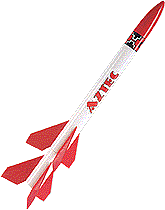| Diameter: | 0.98 inches |
| Length: | 15.25 inches |
| Manufacturer: | Custom Rockets  |
| Skill Level: | 2 |
| Style: | Multi-Stage |
 The Aztec is a 2-stage rocket that recovers on a
streamer. Custom lists it as skill level 2, requiring "some modeling
experience". The lines are simple and clean, making for a very good
looking rocket.
The Aztec is a 2-stage rocket that recovers on a
streamer. Custom lists it as skill level 2, requiring "some modeling
experience". The lines are simple and clean, making for a very good
looking rocket.
Components
The kit comes in a plastic bag. Before opening it up, I inspected the contents
inside, and everything looked fine except that one die-cut fin had been punched
out of its sheet. The body tubes are .976" (Estes BT-50 sized), the
nosecone plastic and fins balsa. Water-slide decals are included. The supplied
shock cord is way too short, and the neon-green streamer looks a little small
to me.
Construction
The instructions are sparse but adequate, and very good diagrams are shown for
each step. There are no surprises here for anyone who's built a few model
rocket kits, but you'll probably substitute your own methods here and there
during construction. Custom marks the fin root with a shallow notch - a nice
touch. The fins are surface mounted but there is no mention made of double glue
joints, which is a simple and effective way to strengthen the fin/body tube
joint. The most challenging part of construction is aligning the booster and
sustainer fins. To make it easier to align the fins perpendicular to the body
tube, slip an engine into the motor mount (be careful not to accidentally glue
it inside!) and point the fins to the nozzle of the engine rather than to the
vaguely defined "center" of an empty tube. Give it a try, you'll be
surprised at how much easier it is to get those fins straight. As usual with
typical kits of this type, I replaced the supplied shock cord with another
piece that was at least 3 body lengths long, in this case, 36" worth. I
used the streamer that came with the kit because our flying field is all soft
grass, and I can put a bigger streamer on easily if necessary.
Finishing
The paint scheme is simple, paint it white, then mask the fins and paint them
red. The nosecone is painted red too. Custom gives good directions on sealing
the fins and how to mask for painting. The decals are simple and good looking.
Flight
Staging is accomplished by taping the motors together with cellophane tape,
then friction fitting the "stack" into the rocket with masking tape. The
directions don't specifically say so, but don't use more than a single wrap of
cellophane tape. That's enough to ensure ignition of the upper stage, and then
let go of the spent booster stage.
Recommended motors (all Estes) for the Aztec are:
- Single Stage: 1/2A6-2, A8-3, B4-4, B6-4, C6-5, and C6-7
- Upper Stage: B6-6 and C6-7
- Booster: B6-0 and C6-0
Not listed but now available, I'd also recommend the A8-5 for both single and upper. In fact, the maiden 2-stage flight for my Aztec will be the B6-0/A8-5 combo, which might be perfect for small fields like a local schoolyard. After the first time, I'll be more aggressive with motor selection, conditions permitting. For single stage flights, an A10-3T or A3-4T mini in an 18mm/13mm adapter would also work well.
Maiden flight was made in March, 2002 on a C6-0/A8-5 combo. Liftoff was fast, but she tipped off the rod because of wind and headed towards a wooded area at about a 30 degree angle, flying straight and stable. She was moving fast and still gaining altitude when staging occurred. Perfect ignition, and the last anyone saw of either part was the booster tumbling into the cattails near the lake, and the sustainer coming down under streamer in the woods. I looked for both pieces, but had no luck.
Conclusion
This is a nice kit. The parts fit well together, the rocket looks good when
finished, and she flies well. Save the big motors for calm days, and you'll no
doubt get more flights from yours than (impatient) I did from mine.
Other Reviews
- Custom Rockets Aztec By Howard Smart (January 31, 2009)
This is a basic 3FNC two-stage rocket with direct staging. The fins on the booster and sustainer are identical, giving it a look that is just a bit different from other two-stage rockets. The parts list: 1 Nose cone, plastic blow-molded 1 Elastic shock cord 1 BT-50 sustainer body 1 BT-50 booster body 1 Tube coupler BT-50 6 Fins, die cut balsa 2 Motor mount tubes BT-20 ...
 |
 |
Flights
 |
 |
Sponsored Ads
 |
 |












M.C.F. (April 19, 2002)